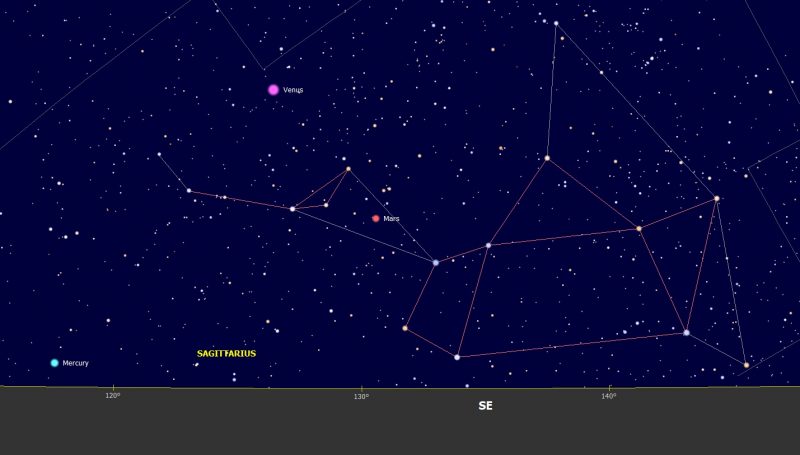
Rocky planets before sunrise
You can spot all four of the rocky planets in our solar system – Mercury, Venus, Earth (look down) and Mars – before sunrise around mid-February 2022. These are our the four major terrestrial planets – made of rocks or metals – in our sun’s family. Commune with them over your morning cup of coffee, before you’re whisked away into a busy day.
For us in the Northern Hemisphere, Venus rises above the dawn horizon first, about 2 1/2 hours before sunrise. Its brilliant white light is unmistakable. Its greatest brilliancy for all of 2022 was February 9. Venus shines mightily at magnitude -4.6. That’s as bright as this neighboring world ever gets. You can’t miss Venus blazing away – in the sunrise direction – at dawn.
Up next is Mars, rising about two hours before the sun from Northern Hemisphere locations. Mars will be farther southeast on the horizon, or to the lower right of Venus, as seen from the northern half of the globe. Mars is faint now, shining at magnitude +1.4. It’s far across the solar system from us, only now emerging after being behind the sun as seen from Earth. But, once you come to know Mars, it’s unmistakable for its red color. Mars will be starkly dimmer than Venus, yet still brighter than the surrounding stars.
Last up is Mercury, the innermost planet to the sun. From the Northern Hemisphere, it rises a little more than an hour before the sun, brighter than Mars at magnitude +0.1. Mercury is up long enough before the sun to let you catch the trio of planets together before the sun’s light spoils the view.
Southern Hemisphere? Never fear. Your view is even better than ours, and you’ll see the planets higher in your eastern sky before dawn. Check Stellarium for specific views from anywhere on Earth.
The 2022 lunar calendars are here. Order yours before they’re gone!
Where will you see these planets?
All three planets start February 2022 in front of the constellation Sagittarius the Archer. However, by February 15, Mercury will cross into Capricornus the Sea Goat.

Bottom line: See all four rocky planets – Mercury, Venus, Mars and Earth beneath your feet – before sunrise from February 11 to 16.
The post Cool! See all 4 rocky planets before sunrise in February first appeared on EarthSky.
from EarthSky https://ift.tt/k918nIL

Rocky planets before sunrise
You can spot all four of the rocky planets in our solar system – Mercury, Venus, Earth (look down) and Mars – before sunrise around mid-February 2022. These are our the four major terrestrial planets – made of rocks or metals – in our sun’s family. Commune with them over your morning cup of coffee, before you’re whisked away into a busy day.
For us in the Northern Hemisphere, Venus rises above the dawn horizon first, about 2 1/2 hours before sunrise. Its brilliant white light is unmistakable. Its greatest brilliancy for all of 2022 was February 9. Venus shines mightily at magnitude -4.6. That’s as bright as this neighboring world ever gets. You can’t miss Venus blazing away – in the sunrise direction – at dawn.
Up next is Mars, rising about two hours before the sun from Northern Hemisphere locations. Mars will be farther southeast on the horizon, or to the lower right of Venus, as seen from the northern half of the globe. Mars is faint now, shining at magnitude +1.4. It’s far across the solar system from us, only now emerging after being behind the sun as seen from Earth. But, once you come to know Mars, it’s unmistakable for its red color. Mars will be starkly dimmer than Venus, yet still brighter than the surrounding stars.
Last up is Mercury, the innermost planet to the sun. From the Northern Hemisphere, it rises a little more than an hour before the sun, brighter than Mars at magnitude +0.1. Mercury is up long enough before the sun to let you catch the trio of planets together before the sun’s light spoils the view.
Southern Hemisphere? Never fear. Your view is even better than ours, and you’ll see the planets higher in your eastern sky before dawn. Check Stellarium for specific views from anywhere on Earth.
The 2022 lunar calendars are here. Order yours before they’re gone!
Where will you see these planets?
All three planets start February 2022 in front of the constellation Sagittarius the Archer. However, by February 15, Mercury will cross into Capricornus the Sea Goat.

Bottom line: See all four rocky planets – Mercury, Venus, Mars and Earth beneath your feet – before sunrise from February 11 to 16.
The post Cool! See all 4 rocky planets before sunrise in February first appeared on EarthSky.
from EarthSky https://ift.tt/k918nIL

Aucun commentaire:
Enregistrer un commentaire